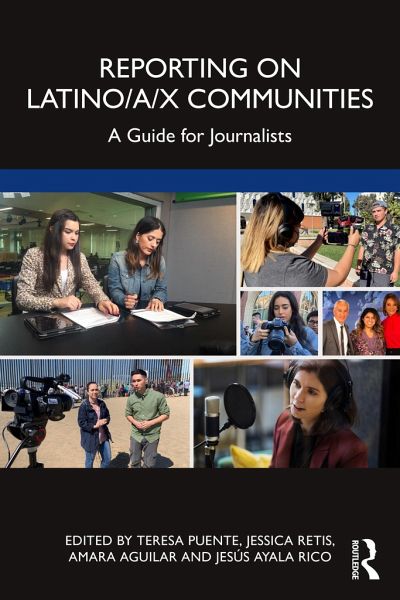Broschiertes Buch
Reporting on Latino/a/x Communities
A Guide for Journalists
Herausgeber: Puente, Teresa; Aguilar, Amara; Retis, Jessica
Versandkostenfrei!
Versandfertig in 1-2 Wochen
Weitere Ausgaben:

PAYBACK Punkte
26 °P sammeln!




This book offers a critical and practical guide for journalists reporting on issues affecting the Latinx community.
Teresa Puente has spent her career reporting on immigration and Latino issues in the U.S. and has also reported extensively from Mexico. Previously, she was a staff reporter at the Chicago Tribune and was on the editorial board at the Chicago Sun-Times. Early in her career, she worked as a reporter for the Press-Telegram in Long Beach and The Orange County Register. Her recent journalistic work has been published in TIME, The Guardian, The Daily Beast, The Hill, The Miami Herald, Fox News Latino, Latino magazine, and In These Times. Puente received the Studs Terkel Award from Public Narrative for her coverage of Chicago's diverse communities. Puente, an assistant professor at CSULB, teaches News Reporting and Ethics, Social Media Communication and Bilingual Magazine Reporting & Production, which publishes the Spanish-language magazine Dig En Español. Puente holds an MFA in creative writing from Columbia College Chicago and a bachelor's degree with a double major in journalism and political science from Indiana University-Bloomington. She previously taught journalism at Columbia College Chicago, was also a visiting assistant professor in the Graduate School of Journalism at Columbia University and taught journalism at the Tecnológico de Monterrey campus in Guadalajara, Mexico. Jessica Retis, Ph.D is Professor in the School of Journalism, Director of the Bilingual Journalism M.A. and Center for University Education Scholarship (CUES) Fellow at the University of Arizona. She holds a Major in Communications (University of Lima, Peru), a Masters in Latin American Studies (Universidad Nacional Autónoma de México) and a Ph.D. in Contemporary Latin America (Complutense University of Madrid, Spain). Retis has three decades of experience as a college educator in Mexico, Spain and the U.S., and two decades as a journalist in Peru, Mexico and Spain. She is co-author of Narratives of Migration, Relocation and Belonging: Latin Americans in London and co-editor of The Handbook of Diasporas, Media and Culture. Her areas of research include: Latin America, migration, diasporas and transnational communities; Latino media in Europe, North America and Asia; journalism studies, bilingual journalism, and journalism education. At the University of Arizona, Dr. Retis teaches Latinxs and News Media in the United States, Global Latinxs, Journalism Theory, and Journalism Research Methods. She serves as the Academic Officer At-Large at the National Association of Hispanic Journalists (NAHJ), co-chair of the Latino/a Studies Section at the Latin American Studies Association, and co-chair of the Diaspora and the Media Working Group at the International Association for Media and Communication Research (IAMCR). She also serves in the board of the Journalism and Mass Communication Quarterly (NMCQ), the flagship journal of the Association of Education in Journalism and Mass Communication (AEJMC). Amara Aguilar is an associate professor of journalism at USC Annenberg School for Communication and Journalism. She teaches journalism for mobile/emerging platforms, social media storytelling for Latinx audiences, visual journalism, engaging diverse communities, public relations strategy, and interactive design, among other courses. At USC, she co-founded Annenberg Media's award-winning bilingual outlet, Dímelo, focused on serving Latinx audiences. Amara has written for the Los Angeles Times, CNN, Nieman Lab, and other outlets. She has worked as a designer, visual journalist, reporter, social media engagement producer and consultant. Amara was honored with the SPJ Distinguished Teaching Award in 2021, earned a Online News Association Challenge Fund grant for Innovation in Education in 2020, was named a TOW Knight Disruptive Educator for innovation in 2018, MediaShift's top innovative journalism educator in 2018, a Scripps Howard Foundation-AEJMC visiting social media fellow in 2017, and an Apple Distinguished Educator in 2015. Her collaborations at USC include work with ABC7, L.A. TACO, NBC Latino, Snap Inc., mitú, Fusion, KPCC, NPR Next Generation Radio, Las Fotos Project, Azteca America, and others. She earned her doctorate at USC's Rossier School of Education in Organizational Change and Leadership, where her research focused on converged newsrooms. Jesús Ayala Rico is one of the most respected and decorated broadcast journalism professors in the country, bringing 20 years of professional journalism experience into the classroom. As a veteran award-winning news producer, Ayala has won four national Emmys and seven Edward R. Murrow Awards and has trained and mentored ten Emmy winners and nine Murrow Award winners. Prof. Ayala teaches courses in both English and Spanish at California State University, Fullerton where he oversees the nationally recognized newscast Al Día- under Ayala's leadership Al Diìa has won over 40 national collegiate journalism awards and became CSUF's first ever Emmy award-winning broadcast. The newscast has also won a Hearst Award, a Pacemaker Award, and the prestigious Edward R. Murrow Award for Best TV newscast. Prior to joining CSUF, Mr. Ayala covered breaking news stories from around the world as a Producer for all ABC News broadcasts including World News Tonight, Good Morning America, Nightline and 20/20. He excelled as an expert covering Latin America and South America and covered the devastating earthquake in Haiti, the Pope's visits to Cuba, civil disturbances in Venezuela, and the rescue of 33 trapped miners in Chile. In 2008, he covered Barack Obama's historic presidential campaign and worked as a White House pool producer. While at ABC News, he worked with news icons like Barbara Walters, Diane Sawyer, Ted Koppel, and the late Peter Jennings. He is a graduate of UC Berkeley and USC's Annenberg School of Journalism, and he obtained his journalism teaching certification from the Walter Cronkite School of Journalism. Prof. Ayala serves as a judge for the Golden Mike Awards, The News & Documentary Emmy Awards, and the Edward R. Murrow Awards.
Produktdetails
- Verlag: Taylor & Francis Ltd
- Seitenzahl: 272
- Erscheinungstermin: 11. Mai 2022
- Englisch
- Abmessung: 229mm x 152mm x 15mm
- Gewicht: 394g
- ISBN-13: 9781032079738
- ISBN-10: 1032079738
- Artikelnr.: 63086881
Herstellerkennzeichnung
Libri GmbH
Europaallee 1
36244 Bad Hersfeld
gpsr@libri.de
Für dieses Produkt wurde noch keine Bewertung abgegeben. Wir würden uns sehr freuen, wenn du die erste Bewertung schreibst!
Eine Bewertung schreiben
Eine Bewertung schreiben
Andere Kunden interessierten sich für














